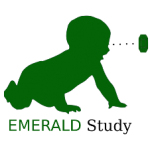About DIAMOND
DIAMOND – Dyadic Interaction And neurodevelopMental Outcomes iN Down syndrome

DIAMOND – Dyadic Interaction And neurodevelopMental Outcomes iN Down syndrome
Collaboration with Children’s Health Ireland, the School of Psychology and the School of Medicine (Trinity College Dublin). Taking place within a state-of-the art infant and child research lab, we use a combination of observational research methods and gold standard assessment tools to capture the dynamic interplay between parenting behaviours (especially speech input) and the early developmental phenotype of children (aged 0-4 years) with Down Syndrome. The study has strongly focussed on addressing the increasing need for understanding individual differences in language abilities of children with Down Syndrome. https://dezzygc.github.io

EMERALD – Eye Movements & Early Markers of Atypical Language Development
This study presents a novel approach for examining basic-level neuropsychological differences contributing to language development in toddlers with Down Syndrome, using eye-tracking techniques to capture eye-gaze dynamics during a speech-matching task. The emphasis of this study is focused on providing a methodology to examine how toddlers with Down syndrome access and use sensory input from mouth movements. We also explore the role of medical covariates, sensory processing profiles, emotional/behavioural characteristics, and social competencies for individual differences in audio-visual attention. Joining a new era of Zoom developmentalists, we also have recently adapted this experiment for moderated online delivery. dezzygc.github.io/EMERALD-poster
Selected DIAMOND research presentations
Grafton‑Clarke, D., Kelly, L., Nixon, E., & Quigley, J. (2021, March 11-12). We need to talk! Insights from Mothers’ and Fathers’ speech to their children with Down Syndrome [Oral Presentation]. 2021 Down Syndrome Education International Research Forum (Held virtually).
Owens, A., Grafton‑Clarke, D., Quigley, J., & Nixon, E. (2021, August 25-27). Use of Mental State Terms by Mothers of Children with Down Syndrome and Child Expressive Language Ability [Poster Presentation]. The 6th Lancaster Conference on Infant and Early Child Development (To be held virtually).
Macaulay, I., Grafton‑Clarke, D., Nixon, E., & Quigley, J. (2021, August 25-27). Maternal Verbal Directives to Toddlers with Down Syndrome: Evidence for Maternal Attunement to Child Language [Poster Presentation]. The 6th Lancaster Conference on Infant and Early Child Development (To be held virtually).
Grafton‑Clarke, D., Nixon, E., Molloy, E., & Quigley, J. (2019, September 18-19). The Power of Parents: Understanding the Significance of Parent‑Child Interaction for Child Development in Down Syndrome [Oral Presentation]. 2019 Down Syndrome Education International Research Forum (University College London, UK).
Grafton‑Clarke, D., Nixon, E., & Quigley, J. (2019, December 5). Don’t BabyTalk me! Are Parents Oversimplifying Language to Children with Down Syndrome? [Lightbulb oral presentation]. Children’s Research Network 2019 Conference (Dublin, Ireland)

